Dear readers,
For the last day of this year’s Pride Month, I have a story about my neurodivergent experience with gender. You can also read this story on Medium. And let me know which parts resonate or do not resonate with you. I’m curious about how other people experience gender!
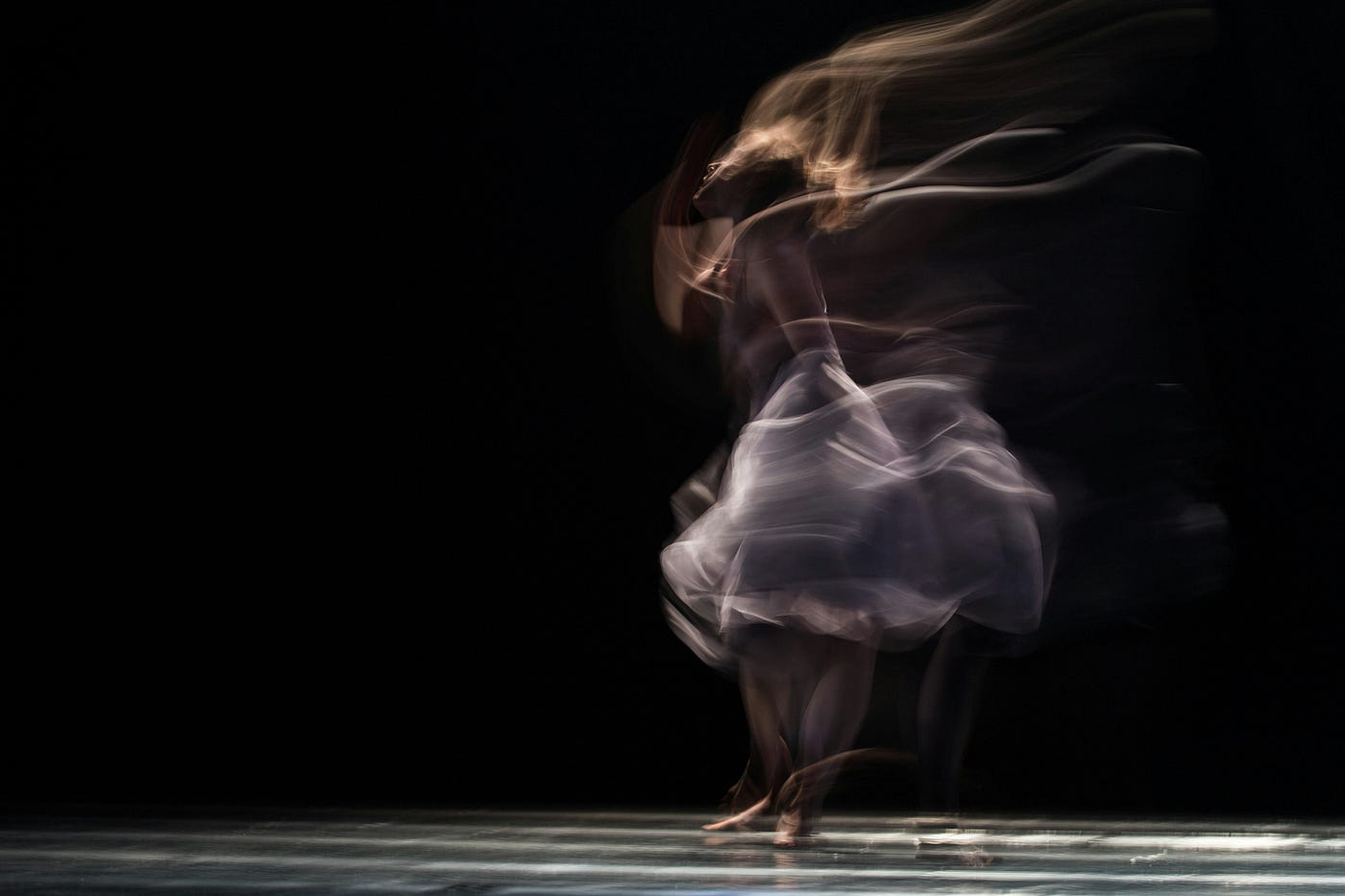
I am 12 years old and one day it suddenly hits me: Girls dress differently from boys. I look in the mirror and I see my boring flat ponytail serving its purpose of taking the hair away from my face. I look at my clothes. They are also “boring”. It’s some random sweater my mom picked up for me. Pants… Are these pants in fashion? All the other girls are wearing bell-bottom pants (yes, this was in the early 2000s!).
“I… I don’t dress like other girls,” I suddenly realized. I was shocked.
But how is this possible, you might ask? How come I had never ever thought about the fact that girls dress differently? Well, I am neurodivergent. Something I know now, ever since I was diagnosed with ADHD and learned about neurodivergence, which has led me to recognize my many autistic traits (no official diagnosis of autism yet).
Neurodivergence is used as a wide term to describe many different neurodevelopmental conditions, such as ADHD, autism, and OCD, among others. It generally refers to any atypical brain functioning. In this post, I focus on my experience with ADHD and possibly autism under the term “neurodivergence”. Having these conditions makes it hard for me to understand and follow social rules and I can only pay attention to the things I like (gender roles not being one of them I guess).
Simply existing in a society inevitably leads to arbitrary rules that just don’t make sense to many neurodivergent people.
The connection between neurodivergence and gender is a curious one. As a neurodivergent person, I am really bad at recognizing, understanding, and playing into social norms. In fact, in order to be socially functional, these things have to come in this order:
First, we need to recognize how a social norm works: What is the rule?
We need to understand why people follow it: Does it make sense? Does it bring anything of value to society?
We need to decide whether we can or want to follow the said social norm: Does it make sense to me?
When I was 12, I wasn’t even at the first step of understanding the social norms surrounding gender. I hadn’t even recognized the difference in clothing between girls and boys. Sure, I knew girls wear dresses sometimes, but somehow I hadn’t connected the dots of me being a girl and needing to dress differently from boys. Or if I did, I never paid attention to it.* Also, my mom had mostly chosen my clothes up to that point.
*For example, I remember wearing a huge princess dress for my first day of school because I thought it was pretty, but then I realized everyone thought I was overdressed. One fellow student asked me if I was going to a wedding afterwards. Even as a kid, I didn’t understand what clothes were appropriate when and what they were signaling to others.
After my world-changing realization about gender, I went shopping. I bought bell-bottom jeans, I untied my hair, and when I looked in the mirror, I saw a female person for the first time. I came to school and my friends were amazed.
They asked me what had brought about this change and a complete makeover. “Makeover? I just untied my hair, and ok, I bought new pants. That’s what people wear, right?” I still wasn’t quite aware of the social significance of this change. But I got the message. People reacted positively. I needed to continue looking like this.
And I did. I leaned into the girly stuff and tried to mimic the things other girls were wearing. But there was a catch.
I was always acutely aware that I was performing.
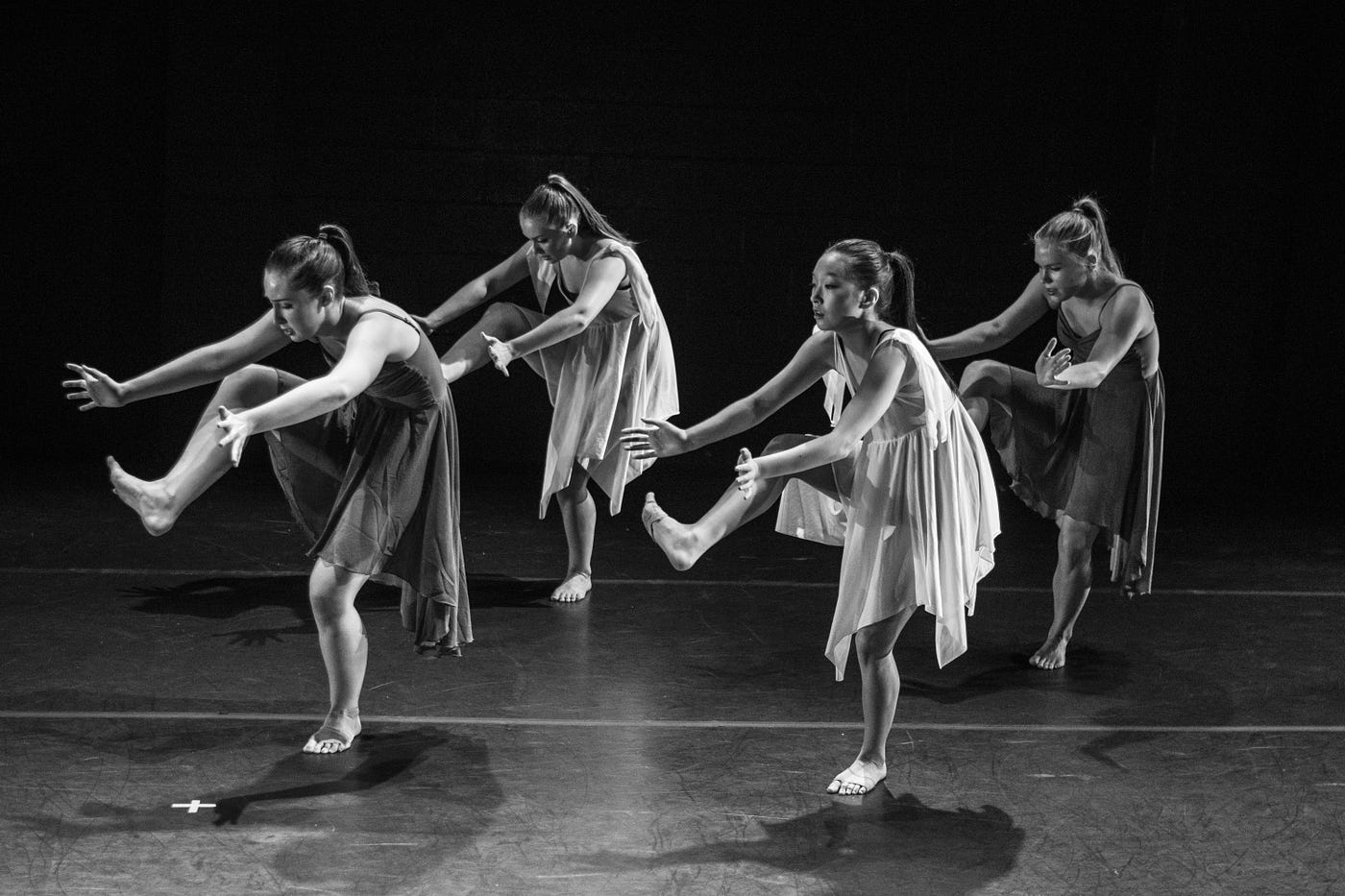
Naturally, at this point I had never heard of Judith Butler’s theory of gender as social performance (which was my inspiration for the title, thank you, Judith!). Oh, but I so felt it. I felt it in my bones. Every day I felt like I was parading at a carnival. Did I leave the correct number of buttons unbuttoned on my shirt? I would count them on other girls and compare. I analyzed gender performance as a science.
Little did I know, all this rule-based thinking and hyper-awareness of every move I made was my autistic brain making sense of social rules that seemed so arbitrary. Why do girls have long hair? No reason. Why do boys wear more sporty clothes? No reason. Why do I need to wear a bra when my breasts are not falling anywhere? No reason. It’s all completely made up.
But I had decided to embrace it and play along as much as I could. After all, people really seemed to like it when I followed these made-up rules. So, I did. And if I’m being honest, over the years, some of these performances did get under my skin, especially after I started dating men.
Heterosexual relationships have a way of pushing the gender buttons to the extreme. Mainly because, now it’s not just other girls telling you you look good, but men tell you they love how you look. And you keep playing into it more and more, giving them what they love so much about women.

Just to make it clear, my gender performance was far from perfect. I would make “mistakes” along the way and sometimes people would get a glimpse of my genderless self. They would say things like “Oh, so you don’t shave there?” or “You cross your legs like a man, funny”. Whenever I heard things like that (well into adulthood), it was the first time I noticed them. These were the social rules that slipped my neurodivergent radar.
And when these small things started accumulating, I came to a point where I said “It is enough! I am not going to shave my whole body and I am going cross my legs in a way I find comfortable”. This went hand in hand with me starting to notice and experience the more serious downsides of my female role, like experiencing sexual harassment and not being taken seriously in professional environments.
In a paradoxical twist of human nature, every gender identity is a performance, even when the identity marks the absence of gender. Simply because everything we do to present ourselves in society is a performance. Even if I present myself as non-binary, I am performing the identity we socially constructed as non-binary.
While some people may disagree, the idea of non-binary resides on the female/male dichotomy in the first place, and non-binary people often signal that they are “in-between” in how they dress and behave. My neurodivergent ass is nowhere on the map! We have to invent a new neurodivergent universe for me.
Simply existing in a society inevitably leads to arbitrary rules that just don’t make sense to many neurodivergent people. There is no label that can describe my utter lack of understanding of what any gender identity is supposed to mean.
The paradox I have to live with is having to perform being a part of society while also trying to be true to myself. So far, in my late 20s and now early 30s, this paradox has led me to go a bit contrary to the social norm, whatever that norm might be. Not too much — just enough to get me in the sweet spot of being socially accepted, while signaling some gender non-conformity.
Ultimately, I am coming back to my original self, the one who doesn’t care about petty social rules on what is fashionable or considered beautiful. I am beautiful regardless of what I wear and how I present myself.
Just to make it clear, I fully respect everyone to whom gender means something and, if you feel it describes a part of yourself, that is beautiful. Celebrate who you are!
Thank you for sticking with me to the very end. As a reward, here is one of my comics about ADHD and gender.
What are your experiences with gender like? Let me know in the comments!
Thank you for reading! If you liked this, click like and share with others.
Ana




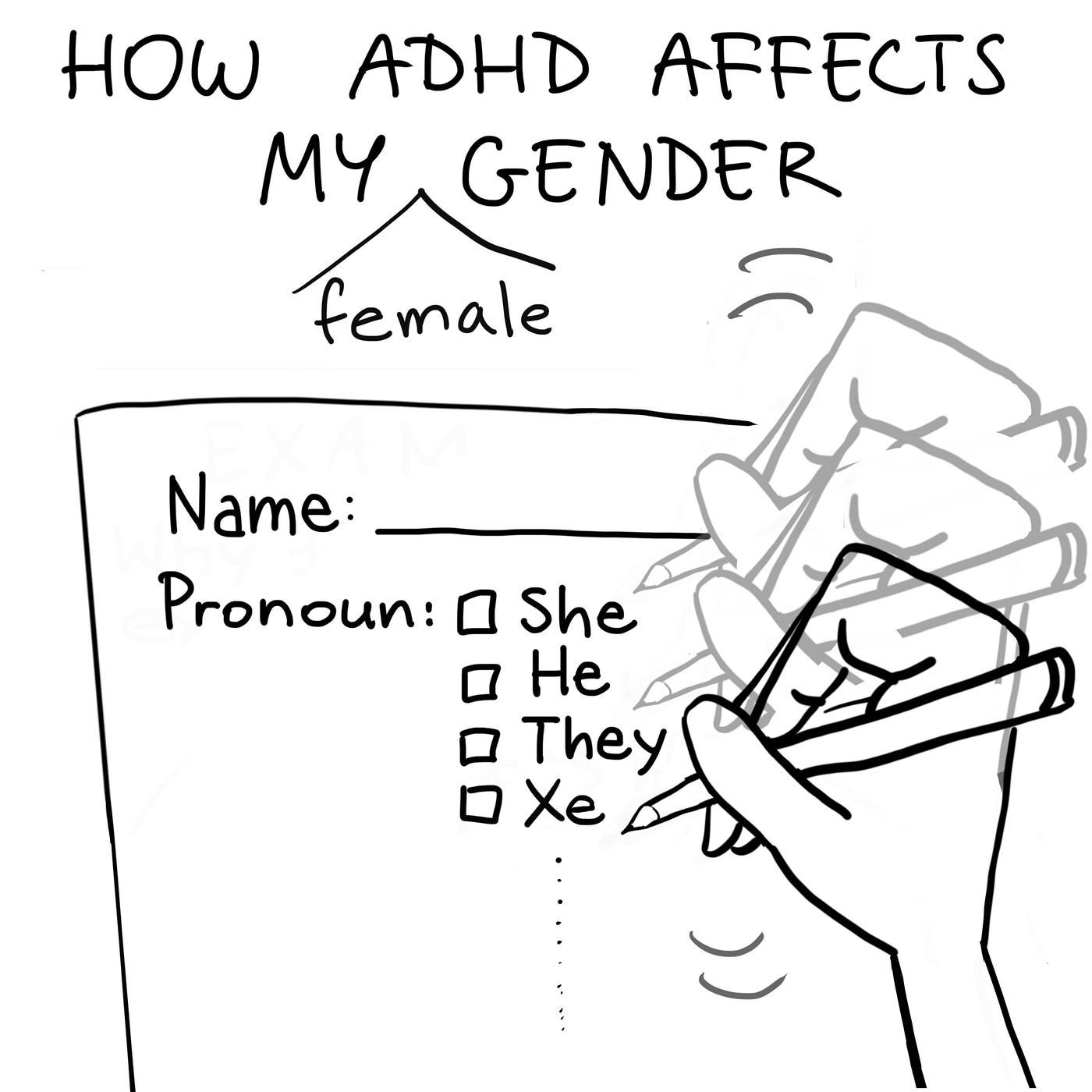

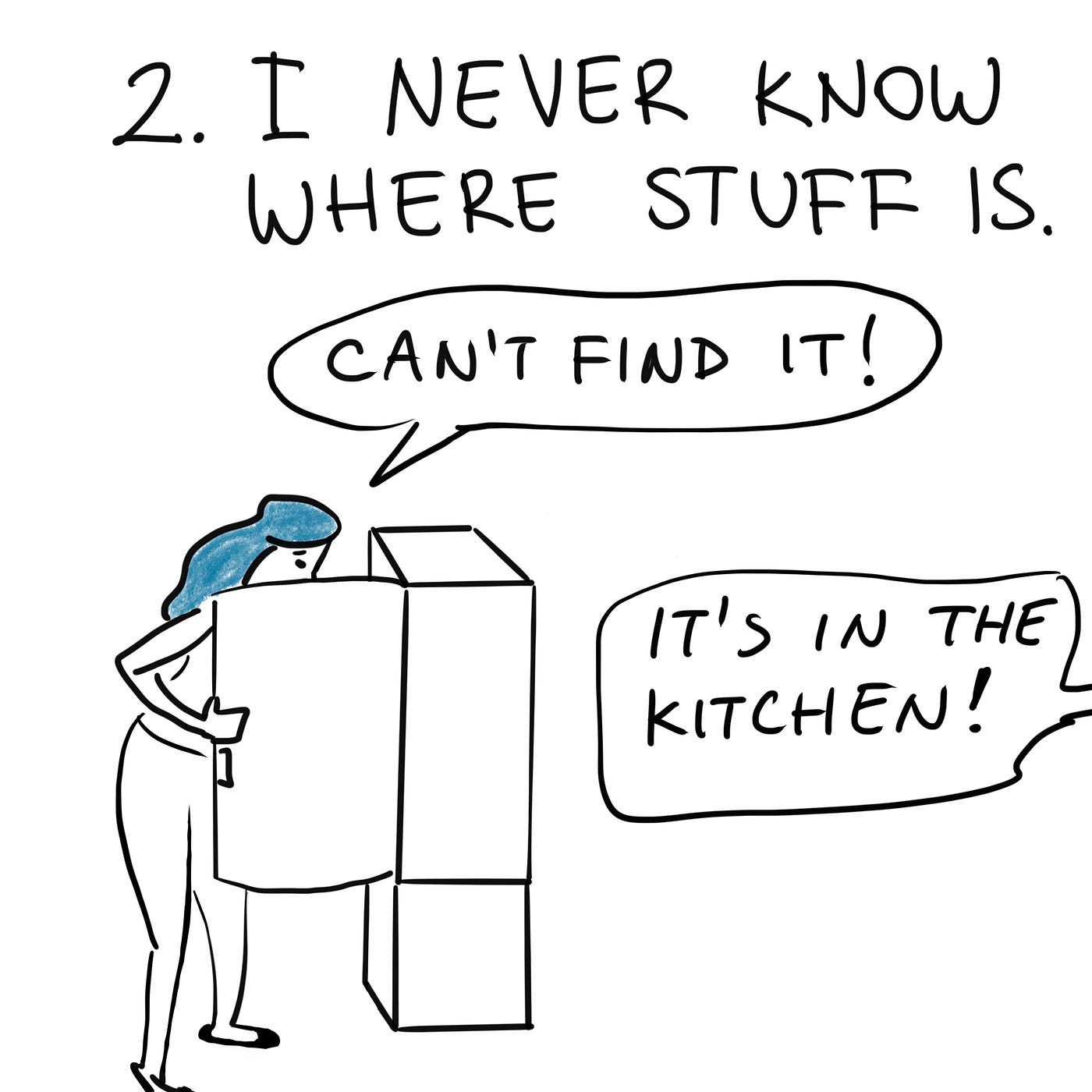

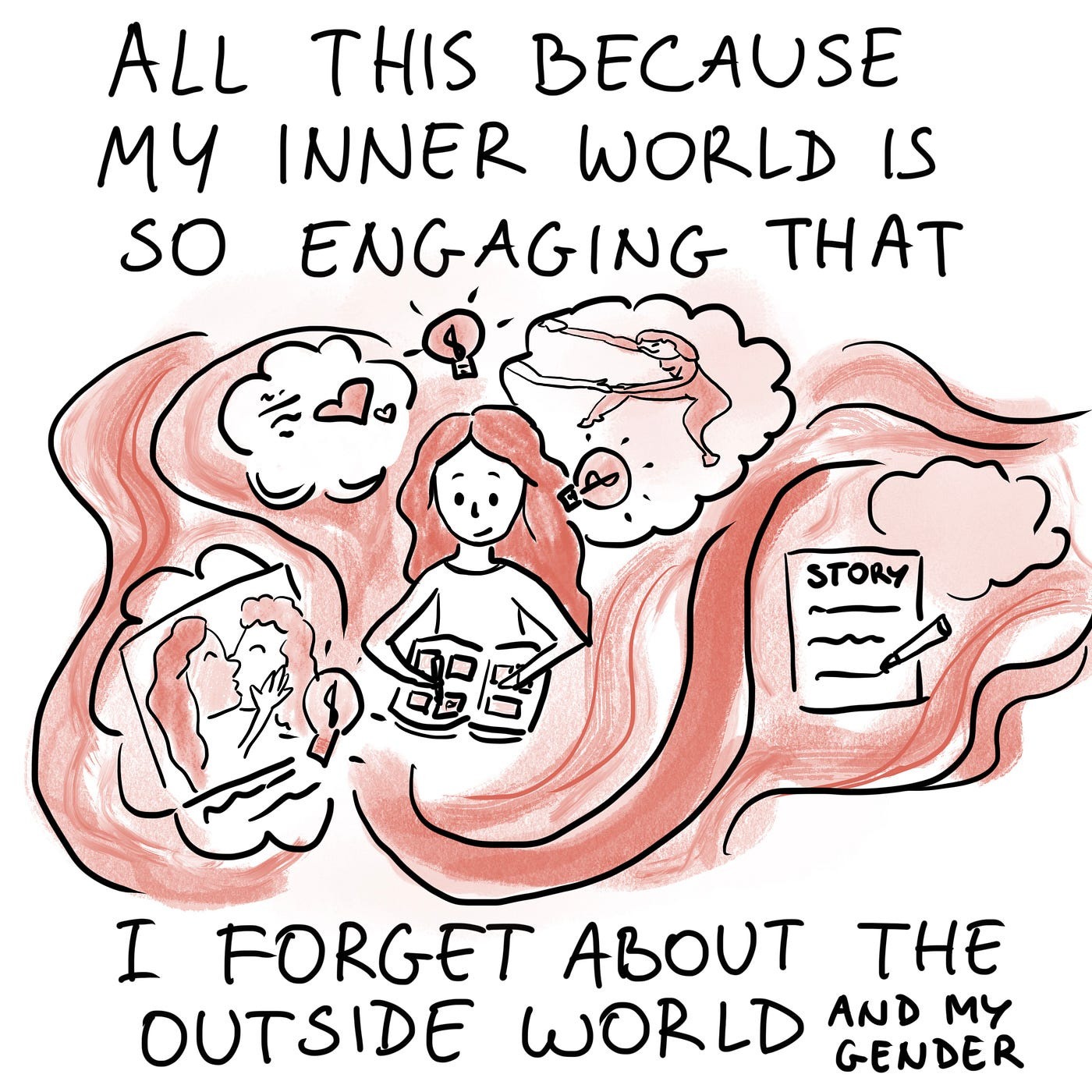
Interesting. I certainly also don't like performing and avoid performative behaviour by others. I've tended to be fairly feminine - I'm a similar age to Barbie after all - but have had short hair for years and don't wear skirts or dresses. I'm married and have two daughters in their late 20s. The younger one was diagnosed with autism and gender dysphoria, also anxiety and depression, aged 15 (undiagnosed ADHD and body dysmorphia also I think). I hope to get an ADHD diagnosis - I'm questioning my whole past life now in the light of this feeling - so yes, all my life has been a performance despite myself - I'd like to be more authentic. My husband is probably on the spectrum and my older daughter has slipped throught the net but is not doing that great. I can look at other relatives - undiagnosed but probably neorodivergent.